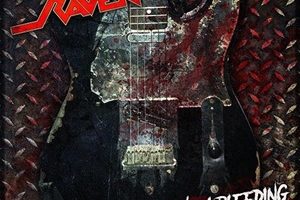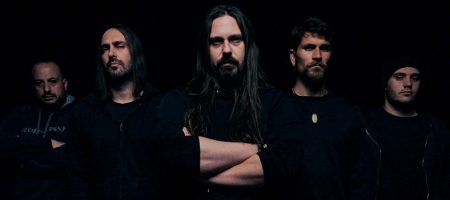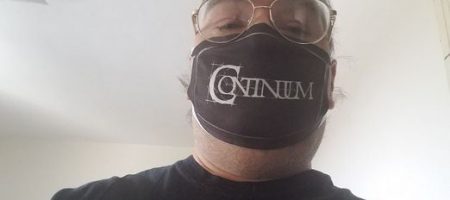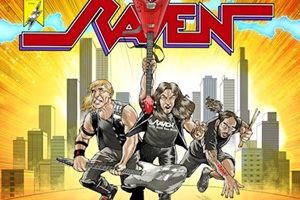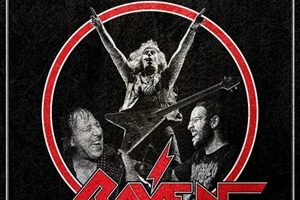Raven – Heavy Lifting
Wednesday, 23rd September 2020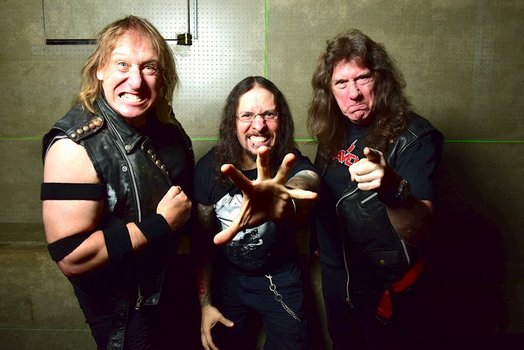
Those familiar with traditional heavy metal already know the story of Raven – and probably have ingested those early 80’s classic records from Rock Until You Drop, Wiped Out, and All for One numerous times. They survived the tumultuous 90’s, continued to expand their touring horizons during the 2000’s and 2010’s – reaching this latest album Metal City with even more vigor and propulsion than ever before. Newest drummer Mike Heller has given these songs dynamic push – faster and broader than imaginable for the Gallagher brothers Mark and John, who even in their early 60’s have not lost their love and respect in the genre.
Ready to tackle more questions with his one of a kind personality and sense of humor, bassist/vocalist John Gallagher is always a treat and pleasure to talk to. You’ll learn more about the process of recording Metal City, include the false start and restart, song choices, what Mike brings to the table – and plenty of talk about the metal scene currently, bass thoughts, and some fun Motörhead memories in the mix.
Dead Rhetoric: Metal City is the latest Raven album – and first with current drummer Mike Heller. What was the game plan in following up ExtermiNation, and did you enjoy having such a powerhouse drummer as Mike to elevate these songs to another level with his abilities?
John Gallagher: Yes. Every time you do a record, you want to raise the bar. We’ve done that successfully on the last two records. I think ExtermiNation was a big leap forward from Walk Through Fire, we had a killer selection of songs. We’d written a ton of songs, the tough part was choosing the right ones. Joe has his heart attack, he’s out of the band – and we had a couple of fill-in guys to do some US dates, and one of them was Mike Heller. We talked for half an hour, he got up and played and we were amazed. And he really nailed it, the two following shows were even better. We had other guys to do the European dates, but we told him we would talk when we got back. He just brought… new blood, a whole adrenaline to the whole thing.
We had the songs, he didn’t write them per se but his energy and with the arrangements, it took the material that was already good to another level above that. I really think this is the best thing we’ve ever done. It was a birthing process to get it here, but it was worth all the difficulties. I’m very proud of it.
Dead Rhetoric: You said that you had more than enough songs – how do you end up whittling down the final ten, because that must be a challenge in and of itself?
John: It’s really a great place to be. There’s nothing worse than saying ‘this is all we’ve got, let’s go with it and hope for the best.’ Luckily we’ve almost never been in that position, we are very prolific with the writing. We had all these cool songs – what would be a great opener? Where would you go from there? And pick them out like that. There were two or three songs that we thought would be a great opener- we picked “The Power”. We just went on consensus, and we tried it and if it didn’t fit, we tried another one. We didn’t have it 100% sequenced as it were, but it kind of sequenced itself.
Dead Rhetoric: You premiered “Top of the Mountain” on your last tour run – does it feel like old times when you test out new material and get feedback from the audiences, as I’d imagine that is what you were able to do with a lot of early Raven songs during the 1980’s?
John: Yes, it was the first time we’ve been able to do this in forever. The reason we did it was we had all these songs, we were going through and we knew it was going to take longer to record them than initially planned because of the initial sessions falling apart, there were some issues with the guy that we originally were working with. We knew it would be later on, so let’s do one of the new songs “Top of the Mountain”. It’s a perfect indicator of where we were going, it’s got one foot in the classic Raven and one foot in the 21st century. With a little bow on top, and it’s been a great song to play live. You get that instant feedback with something that the audience has never heard, and when you get people singing along on the second chorus you know you are in the right place.
Dead Rhetoric: How did the comic book style cover art develop – as there are many correlations between metal and comics over the years? Were you always followers of comic books growing up, and if so what were some of your favorites?
John: I love comic books as a kid. Batman, Superman, X-Men before Wolverine got into it. It was that long ago. Nick Fury, Agents of Shield, all of that. I love that, it was a little window into the American psyche, from England. How to spell certain words, you would see the advertisements and say, what is this? X-Ray specs, I wish I could buy them! And Mike is from a younger generation, but he likes comic books. That was common ground – he came up with an idea for a comic book style t-shirt. It didn’t work out, but we decided to do it on the album. And it was so much better, we chipped in artwork for each song, let’s do the thank you list in the form of an advertisement page in a comic book, literally with drawings and doodles. It’s a lot of fun, a little different because most metal album covers are dark, dower, and kill, kill, kill. We preferred kill, kill, kill and have a smile on our face! It’s a throwback to our youth. It’s colorful, it pops, and there is a lot of cool content.
Dead Rhetoric: Considering Mark and yourself are now in your 60’s, do you try your best to keep the core elements of Raven at hand when writing and developing the songwriting while also incorporating current elements and techniques if they fit naturally into your style? As it seems with songs like “Human Race” and “Break” especially, faster tempos and killer transitions kick in that haven’t been approached in the band in quite a while, if ever?
John: Well, we’ve had fast stuff before, it wasn’t really Joe’s fault though, he was playing slower. He can certainly play double kick material, but if you listen to the live stuff we do “Faster than the Speed of Light” way faster than it used to be. We just had the firepower this time around, so Mike could make the fast songs even faster. That edge is an addition. As far as the writing process, it’s not as analytical, it’s a lot more organic. Those core elements are who we are, and they come out. I’d have to try harder to have (none of) the little individual quirks come out, and come out with certain sequences.
For me personally, I had some clarity of thought. These two riffs here, that doesn’t fit – but if we put this one with that one, yeah, that fits. Just know in my head it will work better. Mark and I had a lot of great stuff. We had a few days off in Brussels, and we stayed in a horrible hotel and slogged away to come up with four or five songs. “Human Race” was one of them, “Battlescarred” was another. It’s always fun to bounce ideas off each other. All three of us did write one song together which is a bonus track for Japan, “Rock This Town” – it’s more of a fun, straightforward rock n’ roll type thing. We’ve written some other stuff since then, we are always forward looking to the next one.
Dead Rhetoric: Where did you want to come across lyrically with some of the songs this time?
John: The music dictates the lyrics, by and large. A song like “When Worlds Collide”, I was playing guitar with the tv on and the sound off. I come up with the main riff, it sounds dramatic. Then I came up with a bass line that’s the opposite and goes down instead of up. All of a sudden it’s orchestrated, sounds huge, and it’s like the end of the world. Cue the lyrics (laughs). “Human Race” was fast – there is the race, and humans. Losing the human race, and it turned into a treatise on the environment and destroying the planet. Stuff like that. It’s floating around in your head, stuff you see on television, situations you’ve been in. “The Power” is kind of Game of Thrones as a dressing, but beneath there is music business politics. You can put on different clothes and make it sound a little different. It’s backstabbing, King of the Hill type crap.
Dead Rhetoric: And “Motorheadin’” is that a tribute to Motörhead, and what are some of your favorite memories as you were able to play with them a lot over the years?
John: Yes. So many. The first time we played with Motörhead was in 1982, we played two shows on the Iron Fist tour. The classic Lemmy, Eddie, Phil lineup. Those guys were so drunk, how do they function? It was the loudest monitors you will ever hear, ever. It sounded brilliant, but you had shellshock by the end of the set. We played with them in America – Metallica was the opening band, and we got bumped onto a show with Motörhead headlining. The dressing room was the kitchen of this huge club. We go back to do the idiot check to make sure that nothing is left behind – and the door of the freezer is open. Out walks Lemmy, this aberration carrying a cardboard box with Pita bread written on it. What are you doing? He says, ‘well, you have to steal something, haven’t you?’ (laughs). The day earlier he was reading jokes from a dirty joke book. He was really a character.
Dead Rhetoric: You mention in the background bio that the new tools of recording are great as long as you use them, and they aren’t using you. How does a band like Raven use these tools to their advantage, and how do you avoid the possible pitfalls that may affect other bands?
John: We’ve recorded the same way for many years. This is the first album that we’ve done in this way since The Pack Is Back, and that album failed in many ways because the feeling was killed due to Rob playing to a click track. Mike played drums before we did anything on this, and he played to a click track but we manipulated it to be slower, faster, goes down and comes back up again. It breathes as a template so he can improvise and come up with a creative performance rather than a start/finish performance. Most of it’s great, but you could have done better. Guitarists, bassists, and vocalists can go in and fix that one syllable – its like painting, get the brush strokes right because it’s not live.
The whole technology thing. We had figured out early on how to drop the whole band in on tape in a few places rather than mindlessly play the same thing forty times for one okay drum track. We did this on Logic, and it worked out great. It’s when you need things live – well, we need those backing tracks, how about those voices, or that forty-eight piece orchestra. Maybe we could hit the play button and go have a drink in the background. That’s ludicrous – there are bands that play that have verbal cues. We are coming to the chorus, one-two-three-four. That’s fucking Broadway- that’s not rock and roll, and we will never do it. We like to play by the seat of our pants, using all this technology, a lot of what we end up doing is improvised and on the spur of the moment. That’s what makes it fresh for us, and exciting for the audience. You don’t quite know what you are going to get. If something goes wrong, sometimes the fun part is how you are going to get out of it.
I use templates like Deep Purple, Iron Maiden, or Jeff Beck – they never play the same show twice, and that’s exciting. You know you are getting something special. Going out there and playing what you played in the studio note for note has no appeal to me, whatsoever. Go be a classical musician.
Dead Rhetoric: What’s the philosophy when it comes to Raven on stage – either in a small club or a festival situation? Are audiences really the same no matter what part of the world you are in?
John: The world is a lot smaller than what it used to be. Audiences are a lot more similar than what they used to be. You play the Latin countries, you play South America, you play Greece, they are crazy, passionate. Gung ho. Japan- they are meek and mild. The first time we played there, we look through the curtain and it was packed and everyone was silent. When we started they all went nuts. In subsequent trips, they’ve learned to go nuts from the start.
We handle things the same way. You play a bigger room, you play a little bigger. Its broader strokes, a little bit more. Overall, the concept is to play the songs and go nuts, put on a show and entertain people. You want that synergy where you are kicking out energy and it’s coming back to you. It’s like playing a football game, where the team is continuously scoring, and everyone is on the same team.
Dead Rhetoric: Do you believe there’s value and stock in putting in the time and craft to become better as a band – subscribing to the thousands of hours it takes in rehearsal and on stage to just become a strong unit?
John: I don’t think we’ve rehearsed for more than four hours with the other drummers since Joe’s heart attack. We did brief production rehearsal before ExtermiNation. We are not in a situation where we live close together. We did put the work in back in the day. We had six years of putting in the time playing in pubs and clubs in the East of England. Live work, there is no better rehearsal than actually doing it. We went out and did the heavy lifting, learning how to face an abusive audience, tame them and turn them onto what you did. We used to play clubs south of here where there is a rival football team, and when they would say, ‘here are the boys from Newcastle’, they would boo from the get go. You would see requests like “Highway Star”, “Smoke on the Water”… and then fuck off! (laughs).
It was trial by fire, and you got through it. By the time we started playing Europe, and America, we’d experienced almost anything people could throw at us and turn around to use it to our advantage. It was a huge advantage, and a lot of young bands don’t get to do that. They sit in their bedrooms and play their arpeggios, play so clean but no real thought of entertainment. We grew up with Slade, T Rex, Status Quo, people who communicated with the audience. We went and watched every band that used to come to Newcastle City Hall, it was our education. You would see why certain bands would die, and other bands did great. A lot of the stuff would be really obvious. When someone threw a temper tantrum on stage and stormed off, that’s never a positive thing. Or when the power went out, how they handled it. Those things are going to happen all the time. It’s like the old adage with the ice skater, it’s not the fall it’s how you get out of it afterwards. It’s all been a part of our apprenticeship.
Dead Rhetoric: The pandemic has definitely put the live concert market in a state of flux – one of the main methods of making money for most rock/metal artists. How have you been handling this downtime – and what do you foresee things looking like when we are finally able to come out and go to shows again?
John: I would replace the word flux with another f word (laughs). We have dates booked in Europe for February 2021. All things being equal, that’s what we are going to do. It’s been terrible, and my personal views would probably get me locked up. I don’t think any of this was justified, and it’s an overblown nightmare that I hope we get out of it. We are stuck in the situation, a lot of people it’s their livelihood. We are lucky that we weren’t planning on touring now. I know bands that started a tour in March, and all your costs are upfront. So they got screwed, the flights, truck rental, what have you. That worked out fine for us.
The only good thing is I think there will be a huge outpouring of good will, and people wanting to go out and have a good time as soon as this thing opens up.
Dead Rhetoric: Having lived in America now since the 1980’s, where do you see the major differences between your upbringing and life in the UK to the United States? Has your outlook on life changed and shifted over the years?
John: I’ve spent a lot of time over here, but I’m in England at the moment. The world is getting smaller, and certain things that originally were the providence of one have grown. The concept of having drive thru coffee in England was impossible to conceive in the 1980’s, that’s for sure. Now it’s common. Another old adage, you can take the boy out of Newcastle, but you can’t take Newcastle out of the boy. Our roots are very deep, that’s for sure.
Dead Rhetoric: Heavy metal in essence as a genre is now over fifty years old. Where do you see the state of the movement – do you consider things healthy, or are there changes you would love to see made if you had the time, energy, and money to be able to improve things?
John: Wow. It’s in flux at the moment. There have been periods where it’s been terrible- the 1990’s were hard for a lot of bands, ourselves included, to march through and get to the other side. I’m starting to see some younger bands who are looking and not ripping off but taking influences from the 1980’s and older bands and making their own thing out of that, and I think that’s very positive. I don’t want to hear another ninth rate Slayer, or the cookie monster anymore. I want to see people trying to do their own thing. Originality has been suffering for a long time. Metal tends to be very divisive and very gated. A lot of the fans, I don’t like that because he’s playing the wrong style guitar. Who cares? Open your mind a little.
And that was thing, when we started playing I listened to everything. Progressive rock, singer/songwriters. There are only two kinds of music in our book – good, and then the stuff you don’t like. Spread your wings, listen to other stuff and maybe draw that into what you do and you can come up with a new slant on what’s going on. If you listen to just one or two bands, you are going to sound like those one or two bands.
Dead Rhetoric: How would you describe your approach on the bass – and where do you see the development and outlook at the instrument change within yourself from your early days to your current approach?
John: I’ve always had the same approach. I think about that, there was a short period of development when I learned the instrument, but I was clearly playing on the bass going up and down with my hands, keep making stuff up. A little more, and what you were hearing in your head is what was coming through on your fingers. It’s fits and starts, you work on stuff that may seem impossible – you give it a break, you come back and like anything it’s impossible only until you can do it. You have to put the work in. I’ve been playing bass now for 46 years – about as long as we started the band. I’m still learning.
With this pandemic I’ve been putting bass videos up on my Facebook page every day for the last 150 days. It’s challenging to come up with something else. “The Rain Song”, “Stairway to Heaven”, a folk song – let’s show what the bass can do with feedback, distortion, echo, tapping, chordal. Two or three minutes every day, and people like it. It’s broadening the palate. It’s having a vocabulary. I’ve approached the bass like it’s more than a fundamental locking in with the kick drum. Most of my playing had been in a three-piece, you’ve got to contribute musically and you have to be melodic. Bring something to the table.
Dead Rhetoric: Since touring plans are probably pushed off until 2021 at the earliest, does this mean that a follow-up studio record could be in the cards sooner than the five-year release schedule currently going? And would you ever think about writing/developing an autobiography on your life, or the history of Raven in general with interesting stories?
John: Yes. I certainly hope we get another album before another five years. We all want to have something quicker than that. We have a few things in the pipeline. There’s talk of doing another Party Killers covers album – we did some initial work on picking out songs. We have the stockpile of songs, and we are still writing. You keep writing and pick the best songs to move forward.
Not that we are looking at stopping, but we aren’t getting any younger. As far as the retrospective thing, I’ve been writing a couple of columns for this Japanese promoter. Basically like chapters out of a book, I know I can do it. It would be long, there are a lot of stories to tell. That is closer to being a thing. It’s a great story, because it’s so improbable. A lot of cautionary tales, a lot of redemption, a lot of bad food- it’s all in there (laughs).











